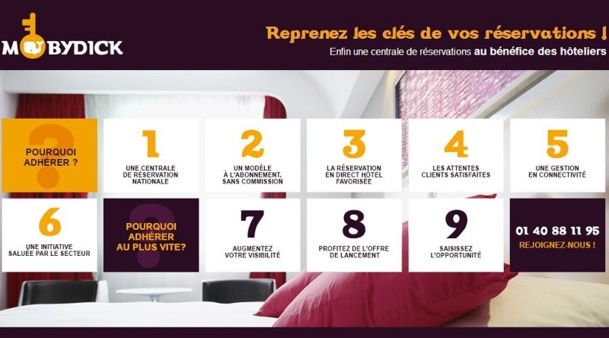
Moby Dick SAS announced the launch of its internet booking system operated in partnership with hoteliers who benefit of a unique position in the database with their membership.
Today, hoteliers must find alternatives to dominant reservation systems. Once we know that a hotel may pay higher commissions to an OTA than the price of its rent, the situation is alarming, to say the least, and needs to be addressed.
Professionals a looking to bypass the commissions charged by online reservations systems.
Fairbooking ("fair reservation") managed to grow in popularity in France. A year after its launch through 18 hotels with Nantes, Fairbooking now lists 2050 hotels from 26 countries.
Inspired by the success of Associations for the Preservation of Peasant Agriculture (AMAP), that puts in direct contact local farmers with surrounding consumers, the creators of this online directory, that links up to official hotel websites, can take credit for having found one piece of the puzzle in solving the unequal relationship between OTAs and hotel owners.
Professionals a looking to bypass the commissions charged by online reservations systems.
Fairbooking ("fair reservation") managed to grow in popularity in France. A year after its launch through 18 hotels with Nantes, Fairbooking now lists 2050 hotels from 26 countries.
Inspired by the success of Associations for the Preservation of Peasant Agriculture (AMAP), that puts in direct contact local farmers with surrounding consumers, the creators of this online directory, that links up to official hotel websites, can take credit for having found one piece of the puzzle in solving the unequal relationship between OTAs and hotel owners.
Reservation systems based on yearly memberships
After being talked about a lot at the governmental level, and in the media, some are trying to find practical solutions (such as Hotels Privés).
This is the case of two companies that started at the same time, and are bringing a similar solution to the problem. Hard to believe that these two players didn’t consult each other beforehand.
Well, absolutely not!
On the one hand, the Moby Dick Project announced this week the creation of a reservation system, that will be membership-based and abandoning the popular principle of commission.
The other, Bgreenbooking is now also part of the picture. This reservation system is aiming at the same concept: no commission but an annual subscription fee for the host.
May this economic model be the ultimate way for hoteliers to take control of their bookings? These entrepreneurs certainly think so.
This is the case of two companies that started at the same time, and are bringing a similar solution to the problem. Hard to believe that these two players didn’t consult each other beforehand.
Well, absolutely not!
On the one hand, the Moby Dick Project announced this week the creation of a reservation system, that will be membership-based and abandoning the popular principle of commission.
The other, Bgreenbooking is now also part of the picture. This reservation system is aiming at the same concept: no commission but an annual subscription fee for the host.
May this economic model be the ultimate way for hoteliers to take control of their bookings? These entrepreneurs certainly think so.
The Moby Dick Project hopes to unite 2,000 hotels
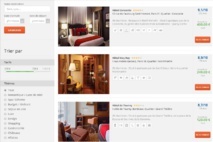
"Our platform is similar to that of OTA in terms of ergonomics."
"Finding a business model that does not crush the hotel owner inspired by success stories from different fields, such as home listings or rental accommodations like Abritel."
That was the mission of Emmanuel Le Clere, who founded Moby Dick, with Jerome Maton.
The purpose of this platform? Promote direct sales and allow the hotel to highlight its destination.
By saving on commission fees, it will have greater flexibility to provide the customer with quality service.
The subscription phase started in late June and continues until late September. Moby Dick hopes to unite 2000 French hotel.
"Our platform is similar to that of OTAs in terms of ergonomics, choice of hotels, the ability to refine the search through filters, customer feedback and the possibility of booking in a few clicks, so simple and secure.
The user chooses to book either through our platform, and we take no commission, or goes directly on the hotel’s official website,” explains Emmanuel Le Clere, a former hotelier who then spent two years at Weekendesk.com.
"The hotel rating, will depend on customer reviews, which will determine its positioning in the results page. We will develop our own feedback system or we'll go through another platform but not TripAdvisor,” he adds.
Positioning itself as a trusted third party, Moby Dick asks the hotel owner an entrance fee (1000 euros plus tax per hotel, payable only in the first year). It is available to all membership subscribers before the launch of the public website in the fall. And an annual membership fee starting at 200 euros fixed fee plus tax and 5 euros per added built room.
"For a 50-room hotel for example, it adds up to 1,000 euros per year. This includes a membership fee to a catalog, quality traffic and reservations."
The UMIH supports this initiative which, once launched, will be one of the alternatives to the dominant systems.
"But the challenge will be to convince hoteliers. The OTAs are taking major steps. The biggest risk is to do nothing,” says one of the founders of Moby Dick.
That was the mission of Emmanuel Le Clere, who founded Moby Dick, with Jerome Maton.
The purpose of this platform? Promote direct sales and allow the hotel to highlight its destination.
By saving on commission fees, it will have greater flexibility to provide the customer with quality service.
The subscription phase started in late June and continues until late September. Moby Dick hopes to unite 2000 French hotel.
"Our platform is similar to that of OTAs in terms of ergonomics, choice of hotels, the ability to refine the search through filters, customer feedback and the possibility of booking in a few clicks, so simple and secure.
The user chooses to book either through our platform, and we take no commission, or goes directly on the hotel’s official website,” explains Emmanuel Le Clere, a former hotelier who then spent two years at Weekendesk.com.
"The hotel rating, will depend on customer reviews, which will determine its positioning in the results page. We will develop our own feedback system or we'll go through another platform but not TripAdvisor,” he adds.
Positioning itself as a trusted third party, Moby Dick asks the hotel owner an entrance fee (1000 euros plus tax per hotel, payable only in the first year). It is available to all membership subscribers before the launch of the public website in the fall. And an annual membership fee starting at 200 euros fixed fee plus tax and 5 euros per added built room.
"For a 50-room hotel for example, it adds up to 1,000 euros per year. This includes a membership fee to a catalog, quality traffic and reservations."
The UMIH supports this initiative which, once launched, will be one of the alternatives to the dominant systems.
"But the challenge will be to convince hoteliers. The OTAs are taking major steps. The biggest risk is to do nothing,” says one of the founders of Moby Dick.
Bgreenbooking with a “sustainable” policy and Weekily as more “general”
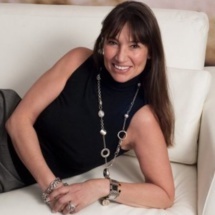
Nathalie Ravyts former hotel owner and founder of Bgreenbooking
Nathalie Ravyts former hotel owner and founder of Bgreenbooking
A vision that is fully shared by Nathalie Ravyts, former hotel owner, who also created a similar business model.
First through Bgreenbooking a reservation system centered towards accommodations that promote an eco-responsible approach (see box); then through another commission-free and membership-based platform, Weekily, that she will launch soon.
To be part of this new sales network, the annual subscription fee is 800 euros plus tax for hotels of over 30 rooms and hotel chains, below this capacity, the price is 350 euros. And in order to be on both platforms, the fee is an additional 150 euros per year.
Currently soliciting accommodation participants, the entrepreneur seems somewhat disappointed with the early feedbacks. "I do not want to fall into a commission system, I want the hotel owners to be the masters of their industry. Our platform directly puts the customer in contact with the hotel.
With Breenbooking for example, the hotel owner is expected to give a 10% discount to the customer. Not on Weekily.
But it gives him the opportunity to differentiate himself with a new form of communication, by giving the means to highlight his unique approaches.
It may perhaps be the sustainable development component that is intimidates hoteliers. Even though the criteria are quite simple; we ask for water aerators, energy-saving light bulbs, “locavor” initiatives…” she asks herself.
The hotel owner envisioned a user-friendly booking platform, with the possibility of creating a commission-free reservation website.
However, she only receives around a dozen hotel offers daily.
A vision that is fully shared by Nathalie Ravyts, former hotel owner, who also created a similar business model.
First through Bgreenbooking a reservation system centered towards accommodations that promote an eco-responsible approach (see box); then through another commission-free and membership-based platform, Weekily, that she will launch soon.
To be part of this new sales network, the annual subscription fee is 800 euros plus tax for hotels of over 30 rooms and hotel chains, below this capacity, the price is 350 euros. And in order to be on both platforms, the fee is an additional 150 euros per year.
Currently soliciting accommodation participants, the entrepreneur seems somewhat disappointed with the early feedbacks. "I do not want to fall into a commission system, I want the hotel owners to be the masters of their industry. Our platform directly puts the customer in contact with the hotel.
With Breenbooking for example, the hotel owner is expected to give a 10% discount to the customer. Not on Weekily.
But it gives him the opportunity to differentiate himself with a new form of communication, by giving the means to highlight his unique approaches.
It may perhaps be the sustainable development component that is intimidates hoteliers. Even though the criteria are quite simple; we ask for water aerators, energy-saving light bulbs, “locavor” initiatives…” she asks herself.
The hotel owner envisioned a user-friendly booking platform, with the possibility of creating a commission-free reservation website.
However, she only receives around a dozen hotel offers daily.
"I don’t ask them to quit Booking"
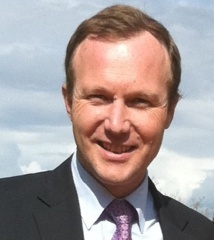
Emmanuel Le Clere, a founding member of Moby Dick
Emmanuel Le Clere, a founding member of Moby Dick
“Hoteliers complain about Booking but they are afraid to go elsewhere. I don’t require them to leave Booking.
It feels as if we were giving a tissue to someone crying but doesn’t use it,” explains the platform’s founder.
Emmanuel Le Clere of Moby Dick has the same argument: "Our goal is not to play in the same league as Booking. For a foreigner to paying a 25% commission fee to an OTA for a hotel reservation may not necessarily seem very expensive.
It is a way to capture an international clientele.
However, for a French client, who is familiar with the hotel, this is too expensive."
Nathalie Ravyts pursues her efforts with unions and hoteliers. She offers a free membership to Bgreenbooking until late August. "I contacted the Tourist Office of Paris to offer 110 accredited institutions free access to the platform. I have not yet received answers, I hope to soon."
This summer, the entrepreneur will also launch another commission-free booking system called Weekily similar to Moby Dick.
b[It is now up to hoteliers "to give a chance to the product”, to take the risk and to change their habits by encouraging creative entrepreneurs who might be visionaries, who knows? ]b
“Hoteliers complain about Booking but they are afraid to go elsewhere. I don’t require them to leave Booking.
It feels as if we were giving a tissue to someone crying but doesn’t use it,” explains the platform’s founder.
Emmanuel Le Clere of Moby Dick has the same argument: "Our goal is not to play in the same league as Booking. For a foreigner to paying a 25% commission fee to an OTA for a hotel reservation may not necessarily seem very expensive.
It is a way to capture an international clientele.
However, for a French client, who is familiar with the hotel, this is too expensive."
Nathalie Ravyts pursues her efforts with unions and hoteliers. She offers a free membership to Bgreenbooking until late August. "I contacted the Tourist Office of Paris to offer 110 accredited institutions free access to the platform. I have not yet received answers, I hope to soon."
This summer, the entrepreneur will also launch another commission-free booking system called Weekily similar to Moby Dick.
b[It is now up to hoteliers "to give a chance to the product”, to take the risk and to change their habits by encouraging creative entrepreneurs who might be visionaries, who knows? ]b
Bgreenbooking a 100% Eco and commission-free hotel platform
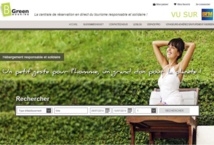
"This platform wants to give sustainable development a different image and prove that being eco-friendly can be very “glamorous”.”
To reconcile tourism, economic development, environment and solidarity, Nathalie Ravyts, former hotel owner, has launched a direct reservation platform: Bgreenbooking.
To encourage sustainable tourism, the entrepreneur chose to reward professionals and tourists who commit to sustainable development.
Bgreenbooking is a direct reservation and commission-free platform for hotels.
The uniqueness of the website is its "win-win concept" the hotel owner can master his customer relationship directly again but must provide the latter a 10% discount in exchange.
Bgreenbooking includes hotels, campsites, cottages and alternative accommodations, accredited or not, but all environmentally sensitive.
"If the hotel is not accredited, we have put together a charter with the EVEA: the accommodation must at least meet one of our 20 good commitments in order to appear on our site.
A rating is given depending the number of green commitments the hotel is making, providing it with a label next to its name. The user can thus determine the hotel’s level of commitment,” says Nathalie Ravyts former hotel owner and founder of Bgreenbooking.
"This platform wants to give sustainable development a different image and prove that being eco-friendly can be very “glamorous”.”
To be on Bgreenbooking, a hotel must meet at least one criterion:
ENERGY
- Electrical equipment has been removed or replaced with more energy efficient equipment
- Minibars, that energy intensive, have been removed to reduce the energy impact
- Heating management has been optimized by the introduction of at least one of these actions: high performance boiler, centralized technical management of heating, heating turns off automatically when windows are open
- The insulation has been improved to avoid heat loss
- The hotel was built/renovated using the principles of green building
- Lighting has been optimized to reduce energy consumption
- Use of renewable energy (hot water, electricity or heating)
WASTE
- The sorting of waste in place
- Composting
- A purchasing policy that favors large format products and/or with returnable packaging
- Distributors of hygiene products are available in bathrooms
WATER
- Flow restrictors (aerators) were installed at all water points
- The flush toilets are equipped with double speed
- Rainwater is collected for certain uses (irrigation, etc.).
FOOD / HEALTH / CARE
- Seasonal and local food products are available to reduce our carbon footprint (production, transport) and encourage local production
- Some of our breakfast products are organic and/or fair trade
- Some of our home, hygiene and cleaning products are eco-labeled
AWARENESS
- Awareness messages are displayed in the rooms and bathrooms to the customers’ attention.
- The staff is aware of and adhere to the commitments made by the hotel for sustainable development
- The team is trained in eco-gesturesb[
To encourage sustainable tourism, the entrepreneur chose to reward professionals and tourists who commit to sustainable development.
Bgreenbooking is a direct reservation and commission-free platform for hotels.
The uniqueness of the website is its "win-win concept" the hotel owner can master his customer relationship directly again but must provide the latter a 10% discount in exchange.
Bgreenbooking includes hotels, campsites, cottages and alternative accommodations, accredited or not, but all environmentally sensitive.
"If the hotel is not accredited, we have put together a charter with the EVEA: the accommodation must at least meet one of our 20 good commitments in order to appear on our site.
A rating is given depending the number of green commitments the hotel is making, providing it with a label next to its name. The user can thus determine the hotel’s level of commitment,” says Nathalie Ravyts former hotel owner and founder of Bgreenbooking.
"This platform wants to give sustainable development a different image and prove that being eco-friendly can be very “glamorous”.”
To be on Bgreenbooking, a hotel must meet at least one criterion:
ENERGY
- Electrical equipment has been removed or replaced with more energy efficient equipment
- Minibars, that energy intensive, have been removed to reduce the energy impact
- Heating management has been optimized by the introduction of at least one of these actions: high performance boiler, centralized technical management of heating, heating turns off automatically when windows are open
- The insulation has been improved to avoid heat loss
- The hotel was built/renovated using the principles of green building
- Lighting has been optimized to reduce energy consumption
- Use of renewable energy (hot water, electricity or heating)
WASTE
- The sorting of waste in place
- Composting
- A purchasing policy that favors large format products and/or with returnable packaging
- Distributors of hygiene products are available in bathrooms
WATER
- Flow restrictors (aerators) were installed at all water points
- The flush toilets are equipped with double speed
- Rainwater is collected for certain uses (irrigation, etc.).
FOOD / HEALTH / CARE
- Seasonal and local food products are available to reduce our carbon footprint (production, transport) and encourage local production
- Some of our breakfast products are organic and/or fair trade
- Some of our home, hygiene and cleaning products are eco-labeled
AWARENESS
- Awareness messages are displayed in the rooms and bathrooms to the customers’ attention.
- The staff is aware of and adhere to the commitments made by the hotel for sustainable development
- The team is trained in eco-gesturesb[






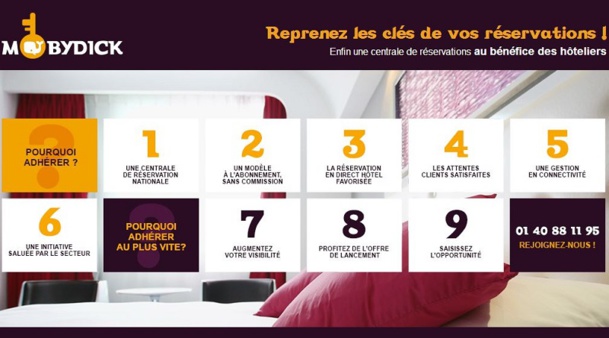

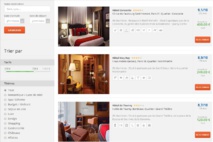
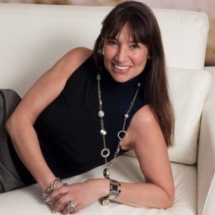
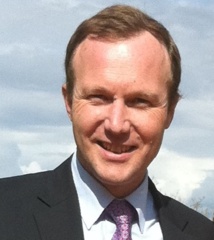
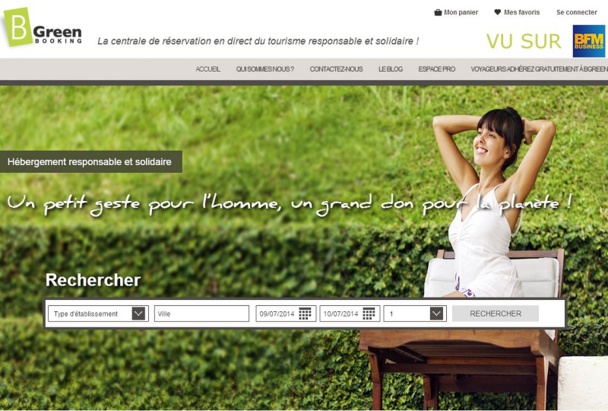







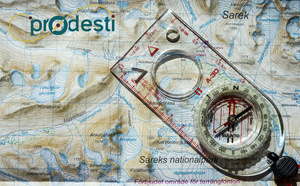






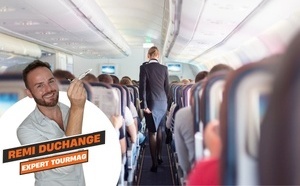




![Une France senior ? Oui, mais laquelle ? [ABO] Une France senior ? Oui, mais laquelle ? [ABO]](https://www.tourmag.com/photo/art/large_16_9/87604212-62124775.jpg?v=1743538797)















